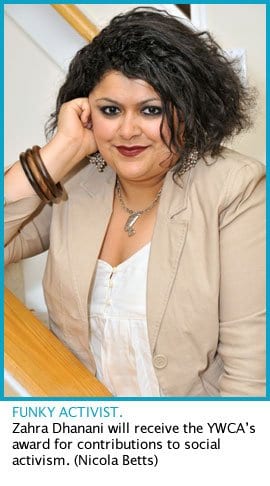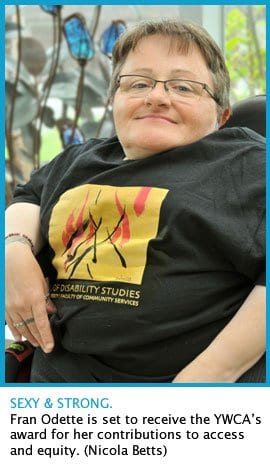On Tue, Jun 3 the YWCA presents its 28th-annual Women of Distinction Awards with a banquet at the Metro Toronto Convention Centre. Among this year’s honorees are queers Zahra Dhanani, who will be recognized for her contributions to social change, and Fran Odette, who will be recognized for her contributions to access and equity.
Dhanani says she’s been drawn to social activism from an early age after observing gender inequalities in the relationships she saw in her family between her uncles and aunts, both in the home and at the mosque. She says it was personal experiences that led her to tackle issues in the public sphere.
“I’ve just realized that I have a personality and a drive and an inclination… that I can’t not be involved,” she says, “so wherever I am I’m involved and Toronto happens to be the place I am.”
Born in Tanzania, Dhanani lived in Vancouver and then Edmonton before settling in a South Asian neighbourhood in Toronto when she was 13.
“I grew up with a certain cultural expression that makes me very rich, that I don’t have to pretend to be white to be taken seriously,” she says.
Dhanani currently works as the legal director for the Metropolitan Action Committee on Violence Against Women. For the past five years she’s been working in restorative justice. “It’s a concept of justice that focuses on reparation, healing and looking at relationships as opposed to rules.”
Prior to that she focused on immigration and refugee law. She says her work as a lawyer has allowed her to continue her social justice work through her professional life. All in all she’s been working in the antiviolence movement for more than 17 years.
“That is what I love about being a lawyer because I can take a macro analysis and make it real in the individual advocacy for women,” says Dhanani. “So when I’ve represented immigrant and refugee women who were escaping violence from their countries of origin and to be able to work on their refugee claims or their landing applications and at the end see them coming out with a positive decision… there’s a sense that I have played a small role in their empowerment.”
Dhanani, who was the Honoured Dyke in Toronto’s 2006 Dyke March and the creator of the Funkasia parties, says she’s particularly interested in advancing the rights of women of colour and aboriginal women.
“We’ve got a history of racist legislation that has affected people of colour in general but women of colour very adversely and there have been a lot of white women who’ve advocated for social change but only to the benefit of white women,” she says, citing examples ranging from women’s suffrage in 1921 (some aboriginal people didn’t get the right to vote until 1960) to high rates of violence against aboriginal women which Dhanani says aren’t getting enough attention.
Dhanani says that when she came out 17 years ago it was into a “woman of colour community.”
“[There were] women of the generation before me, who had begun to, from the ’70s, activate for social change for women — women of colour and queer women of colour. It was an exciting time and yet it was so very marginal.”
These days Dhanani says she’s working to create a social movement that addresses multiple oppressions. “I think that at some level when you have privilege, whether it’s racial or class-based privilege, it’s easy to be ignorant to the realities of those less fortunate people around you,” she says. “It’s harder work to put forward an equity agenda that’s holistic, that includes all people’s rights.
“I would just like to push the larger queer community to create more space and visibility for queer people of colour…. It will mean more room for all of us rather than less room for one of us.”
***
Odette’s work advocating for the rights of women with disabilities — and in particular fighting violence against women with disabilities — was also sparked by personal experience.
“I was in a relationship that was not emotionally healthy and I actually, through that experience, tried to find supports for myself — and there weren’t that many,” says Odette, who now works as the program manager at Springtide Resources, an agency working to end violence against women.
At that time Odette lived in Ottawa but upon her return to Toronto she became involved with the Disabled Women’s Network Ontario, a volunteer-run organization that advocates for women with disabilities and raises awareness. After speaking with other women about their experiences Odette says she had an epiphany: “This is not about you.”
“If I am struggling with this and I have solid supports in my life generally,” asks Odette, “what is it like for women who don’t? Who know it’s not okay but might not identify it as abuse?”
Odette, who has a Masters of Social Work from Carleton University, has spent two decades working to improve the lives of women with disabilities through her professional and volunteer work. She has advised on numerous projects including the Rainbow Health Network and the Anne Johnston Health Station’s Barrier Free Health Program and she’s worked on research projects involving women and disabilities for institutions including the University of Toronto and the Centre for Research in Women’s Health.
“What has kept me in this work is the underlining belief for me that all women should have the opportunity to live their lives free of violence,” she says.
Odette has also worked to change the perception that women with disabilities aren’t sexual, which included coauthoring The Ultimate Guide to Sex and Disability, published in 2003. She’s also written about the role of attendant caregivers in the sex lives of people with disabilities, particularly when it comes to queer sex.
“It is time you see us in your analysis around sex and sexuality and who can be sexual to really push people’s boundaries and comfort levels,” she says.
She says the common belief that women with disabilities aren’t sexual makes it more difficult to address sexual assault perpetrated against them.
“If we look at violence, for example sexual violence, and we put that into context of what people’s understandings are… it is about sex. How can someone with a disability be sexually assaulted because [the misconception is that] we don’t have sex anyways?”
Odette says she’d like to see the queer scene become more welcoming of people living with disabilities. “Even to be able to engage in the community socially there are very few places in the village I can go to — or I can go to them but I can’t go to the bathroom.”


 Why you can trust Xtra
Why you can trust Xtra


